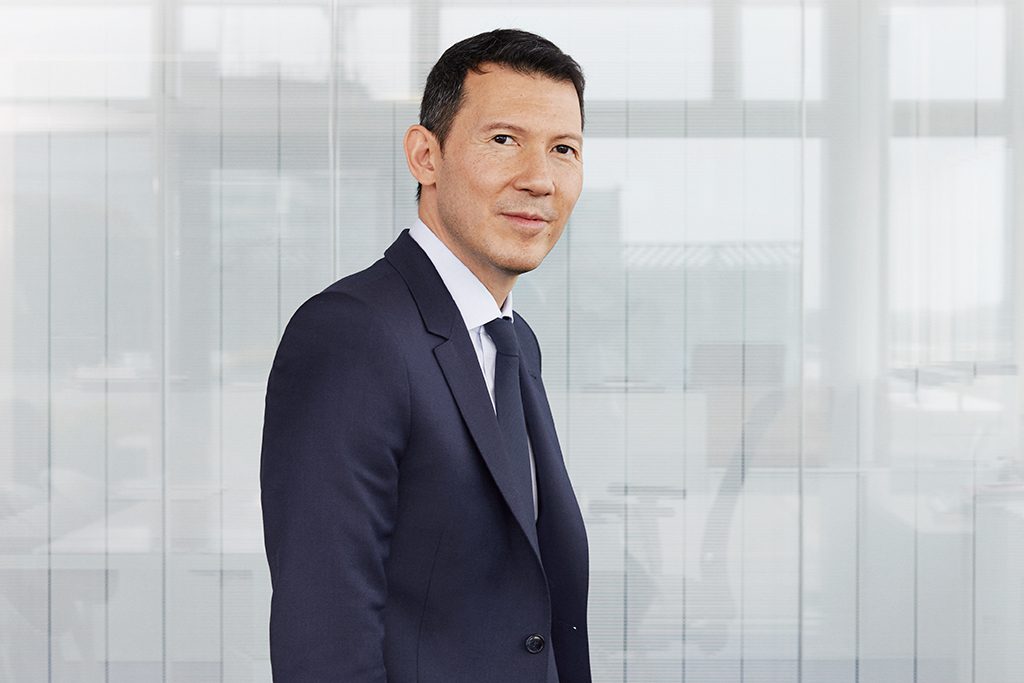Skift Take
Air France-KLM has been content with the status quo for a long time. Under new CEO Ben Smith, that's changing. But is it too much change, too fast?
 Travel's most forward-thinking insiders will gather September 18–19 for our annual Skift Global Forum in New York. In just a few years, Skift's Forums — the largest creative business gatherings in the global travel industry — have become what media, speakers, and attendees have called the “TED Talks of travel.”
Travel's most forward-thinking insiders will gather September 18–19 for our annual Skift Global Forum in New York. In just a few years, Skift's Forums — the largest creative business gatherings in the global travel industry — have become what media, speakers, and attendees have called the “TED Talks of travel.”
Skift Global Forum 2019 will take place at Jazz at Lincoln Center’s Frederick P. Rose Hall in New York. This year's Forum speakers include CEOs and top executives from Booking Holdings, Delta Air Lines, Expedia, Air France-KLM, Marriott International, Amtrak, and many more.
Since Air France and KLM merged in 2004 to create what was then the world’s largest carrier by revenue, a series of CEOs has tried to keep the peace in Paris and Amsterdam. These executives allowed managers in each country to operate the carriers as they pleased while begging French unions to accept any deal that might make the company more competitive with EasyJet, Ryanair, and other low-cost carriers.
But the current CEO, Ben Smith, arrived a year ago with a different mandate. Yes, he wants to make stakeholders happy, including employees and the two national governments. Yet Smith also wants to shake the malaise that has made Air France-KLM the worst-performing of Europe’s major airline groups, despite the storied history of both carriers.
“The main challenge going forward is, how do we get our brands to the top of the industry?” Smith said in a telephone interview.
KLM is not so far away. The Dutch airline was in rough financial shape before it merged with Air France, but since then it has thrived, leveraging its central hub in Amsterdam to attract lucrative connecting passengers from all over the world. Air France is a different matter, with the airline long crippled by labor issues, an inconsistent product, and an inefficient fleet, including 10 Airbus A380s it does not need.
Smith, who was chief operating officer at Air Canada, is trying to meld the company into a more cohesive group that can better compete across Europe. He’s had some successes, including with Air France labor unions, but he has also run into challenges. After reports in February indicated he wanted to force out KLM’s CEO, the Dutch government quietly amassed a 14 percent stake in the company to increase its leverage. The CEO, Pieter Elbers, remained.
Smith will speak Sept.18–19 at Skift Global Forum in New York City. We recently spoke with him to preview the discussion.
Note: The interview has been condensed and edited for length and clarity.
Skift: You spent most of your career at Air Canada, restructuring a smaller airline in relative anonymity. A year ago, you moved to Paris, and now the press reports, often critically, on everything that happens at the company. There’s intrigue, for example, about the contempt the Dutch and French sides may have for each other. Has this surprised you?
Ben Smith: There’s an enormous amount of focus on the inner workings of the Air France-KLM group. I think it has been totally blown out of the water and blown out of proportion by the media. It’s a big company. We have 84,000 employees. I think what’s very special and unique about Air France and KLM is that they both have very strong ties to the aviation industry in each country and strong ties to the national pride in each country and are icons in each country. In the United States, there really isn’t a flag carrier left. The one that really carried the U.S. flag was Pan American. Look at the businesses that exist today. The big four airlines in the U.S.— Delta, United, American, Southwest — they’re not flag-carrying airlines.
Air France and KLM are flag-carrying airlines. That has a very different emotional appeal. It means a lot more to the country whether they fly or they don’t fly a route. Of course, France and the Netherlands have very different cultures. I’m the first non-French CEO, and we’ve been trying to move to a clearer, more businesslike managerial governance. Naturally, when you’re trying to instill change, some people get defensive. But the real focus here is to leverage the enormous support in both countries. Not every other jurisdiction has that. It is a huge plus.
That’s how we’re trying to shift the focus foward. There’s nothing wrong with being nationalistic and loving and supporting your own flag carrier. I think more and more people are remembering that the strength of these two brands together from a commercial power perspective is a huge asset. That’s how I see it.
Join Us at Skift Global Forum!
Skift: You’ve said the short-haul network must be restructured to allow the group to compete with low-cost carriers. Air France-KLM last week announced it reached an agreement with pilots to lift a cap on the number of airplanes your low-cost subsidiary, Transavia France, can fly. How will this change the dynamics?
Smith: We’re like over the moon with it. The idea of pilots at a legacy carrier ratifying a deal of this type, especially with an airline like Air France that has had such a tough history when it comes to labor relations in a country that has some of the toughest labor laws for airlines to have to work under, is huge. Look at the way the low-cost-carriers in Europe have taken advantage of [labor cost advantages]. Look at the penetration into the secondary France cities from Europe from EasyJet, Ryanair, Volotea, Vueling, and all these different carriers. Air France is pretty much out of the France-European market from all of these cities. This will give us a tool to get back in. We will leverage our Flying Blue loyalty program. Customers [in secondary cities] will still have a choice of flying to Paris on Air France, and connecting over [Paris] globally on Air France. And if they need to fly to Europe [nonstop], they’ll now have this choice of Transavia. It changes the game for us. We know the cost model of Transavia is in line with these LCCs [low-cost carriers].
Skift: Also last week, you announced changes to Air France’s fleet. You’ll take 60 Airbus A220s for shorter flights and retire the Airbus A380s early. As a company matter, the A220s are likely more important, because you’ll fly the newest, most fuel-efficient narrow-body plane. But aviation romantics want to know why you’re retiring the A380s by 2022. Air France took its first A380 in October 2009. Yet they’re no good anymore?
Smith: A number of reasons. One is that the fleet at Air France and at most carriers that have had this airplane is quite small. With only 10 to operationally support, it is difficult. The airplane is also the poorest performer from an operational perspective so we have a lot of issues — technical issues with delays and cancellations —and to try to protect customers on such a big airplane when you only have 10 of them, it’s very hard and very expensive. Then there’s the four engines and the cost to maintain those four engines, and the fuel efficiency, and the unplanned heavy maintenance checks that are upcoming and the engine overhaul. It would cost us to the tune of 55 million euros ($61 million) per aircraft to keep these up and running in good shape.
[Also,] we were just going to start our complete interior renovation to bring it up to our latest product standard, which would’ve cost between 30 and 40 million euros an airplane. So we have all this maintenance coming up, and we have all this expense on cabin refurbishment.
The airplane does not offer us any economical advantage versus other airplanes. In fact, it restricts us from operating additional frequencies, which is in most cases something business customers appreciate.
Then there is a last item which is unique for Air France. Charles de Gaulle Airport here is not full. We can add frequencies. British Airways at Heathrow is full. Frankfurt is full. Look at the airports that we fly to around the world where such an airplane would be of use. In New York Kennedy, we have five slots. The requirement for an A380 is not there. There’s room at Kennedy. It’s just the prime times that are full. Los Angeles is not full. We use the 380 there. Miami is not full, San Francisco is not full. Mexico City is not full. The need for using an airplane that maximizes a slot is not there.
Skift: We’ve heard about a growing backlash against travel in Europe because of environmental concerns, and your airlines are starting to respond. Elbers, CEO of KLM, recently wrote an open letter to customers asking them to make “responsible decisions about flying.” Is the airline industry doing enough to be proactive about climate change? Some entities want to tax you more.
Smith: When you look at the technological improvements over the last few decades and the environmental impact that current generation airplanes have, it’s so much better than in the past for CO2 emissions, noise. We just haven’t done a great job of educating stakeholders. I think that’s step one. We just placed this huge order for the A220. What an improvement that is from an emissions perspective and noise perspective. We’re investing in these types of improvements. Taxing us even more and putting more pressure on our ability to make money when we’ve already got very thin margins makes it more difficult to upgrade the fleet.
At KLM, “Fly Responsibly'” is the campaign. It’s not about flying less. The main message is that, as an airline, we have a huge responsibility — more so than perhaps other companies because we are a high-visibility industry, and we take it seriously. We’re responsible about it. We don’t have the perfect answers. We’d like to be as a group ahead of other carriers or groups, and that means taking some risks and trying different things. We don’t have the magic answers to say how we are going to get a step ahead. We’re just trying to catch up to ensure that our brands maintain their value and are looked at from a fair perspective.
The Daily Newsletter
Our daily coverage of the global travel industry. Written by editors and analysts from across Skift’s brands.
Have a confidential tip for Skift? Get in touch
Tags: air france-klm, ben smith, sgf2019, skift global forum
Photo credit: Air France-KLM CEO Ben Smith will speak at Skift Global Forum in New York City on September 18–19. Air France-KLM
